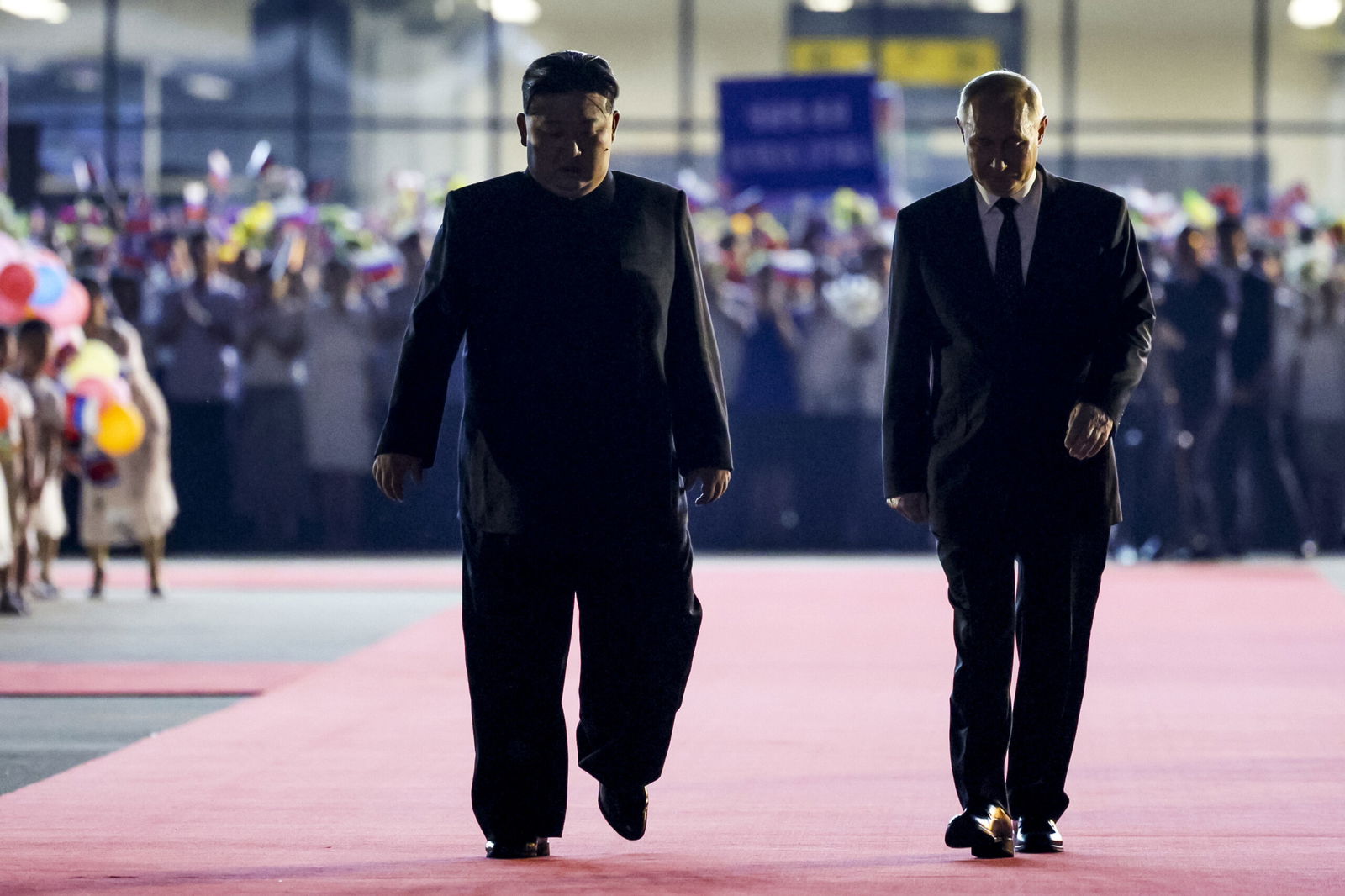Around the World brief

By Associated Press
North Korean officials seek
medicine for Kim’s health problems related to obesity, Seoul says
SEOUL, South Korea | North Korean leader Kim Jong Un has regained weight and appears to have obesity-related health problems such as high blood pressure and diabetes, and his officials are looking for new medicines abroad to treat them, South Korea’s spy agency told lawmakers Monday.
The 40-year-old Kim, known for heavy drinking and smoking, comes from a family with a history of heart problems. Both his father and grandfather, who ruled North Korea before his 2011 inheritance of power, died of heart issues.
Some observers said Kim, who is about 5 feet, 7 inches tall and previously weighed 308 pounds, appeared to have lost a large amount of weight in 2021, likely from changing his diet. But recent state media footage show he has regained the weight.
On Monday, the National Intelligence Service, South Korea’s main spy agency, told lawmakers in a closed-door briefing that Kim is estimated to weigh about 140 kilograms (308 pounds) again and is in a high-risk group for heart disease, according to Lee Seong Kweun, one of the lawmakers.
Lee said the NIS told lawmakers that Kim has shown symptoms of high blood pressure and diabetes since his early 30s. Another lawmaker, Park Sunwon, said the NIS believes Kim’s obesity is linked to his drinking, smoking and stress.
Lee and Park quoted the NIS as saying it obtained intelligence that North Korean officials have been trying to get new medications abroad for Kim’s suspected high blood pressure and diabetes.
North Korea is one of the most secretive countries in the world, and there is virtually no way for outsiders to know Kim’s exact health conditions. The NIS also has a spotty record in confirming developments in North Korea.
Kim’s health is the focus of keen attention outside North Korea since he hasn’t formally anointed a successor who would take charge of the country’s advancing nuclear arsenal targeting the United States and its allies if he was incapacitated.
The NIS in its Monday briefing maintained its assessment that Kim’s preteen daughter, reportedly named Kim Ju Ae, is bolstering her likely status as her father’s heir apparent. But the NIS said it cannot rule out the possibility that she could be replaced by one of her siblings because she hasn’t been officially designated as her father’s successor.
Speculation about Kim Ju Ae, who is about 10 or 11 years old, flared when she accompanied her father at high-profile public events starting in late 2022. State media called her Kim Jong Un’s “most beloved” or “respected” child and churned out footage and photos proving her rising political standing and closeness with her father.
The NIS told lawmakers that at least 60% of Kim Ju Ae’s public activities have involved attending military events with her father.
The Taliban say they no longer recognize Afghan diplomatic missions set up by the former government
ISLAMABAD | The Taliban said Tuesday they no longer recognize Afghanistan’s diplomatic missions set up by the former, Western-backed government and that they will not honor passports, visas and other documents issued by diplomats associated with the previous administration.
It’s the latest attempt by the Taliban to take control of Afghanistan’s embassies and consulates since returning to power in 2021. Many Taliban leaders are under sanctions, and no country recognizes them as Afghanistan’s legitimate rulers.
The country’s seat at the United Nations is still held by the former government, which was led by Ashraf Ghani, though the Taliban administration is seeking to claim that seat as well.
In a statement posted on the social media platform X, the Ministry of Foreign Affairs said that documents issued by missions in London, Berlin, Belgium, Bonn, Switzerland, Austria, France, Italy, Greece, Poland, Australia, Sweden, Canada and Norway are no longer accepted and the ministry “bears no responsibility” for those documents.
The documents would include passports, visa stickers, deeds and endorsements.
The ministry said people in those countries will instead need to approach embassies and consulates controlled by the Taliban administration — the Islamic Emirate of Afghanistan, as they call their government.
“All Afghan nationals living abroad and foreigners can visit the IEA political and consular missions in other countries, other than the above-mentioned missions, to access consular services,” the post said.
The Taliban did not immediately respond to queries seeking clarification or additional details.
An Afghan national living in London where he is pursuing a master’s degree, Asad Mobariz, said he was disappointed and frustrated with the decision. It’s unfair and impractical to expect Afghans in the affected countries to travel to another country for consular services, he said.
“This decision disregards our needs and places an undue burden on us,” he told The Associated Press. “These services are crucial for my ability to travel, work and maintain my legal status in the U.K.”
The move puts the burden on Afghans living in Europe and will lead to increased financial strain and potential legal issues for those unable to access consular services locally, he said.
Another Afghan national, Adnan Najibi, who lives in Germany, said discrediting embassies was unlikely to benefit the Taliban.
“I live in a small town with a relatively low population; however, I still see that there are hundreds of Afghans living here,” Najibi said. “If someone previously obtained an Afghan passport, marriage certificate or any other document in a day, it may now take weeks or even longer.”
The German government said Tuesday it was assessing the potential impact of this announcement.
Afghanistan’s embassy in Britain said on X that it “firmly declares” it will continue all its consular and diplomatic services without any interruption.
In March 2023, the Taliban said they were trying to take charge of more Afghan embassies abroad. Their chief spokesman, Zabihullah Mujahid, said the administration had sent diplomats to at least 14 countries.
The new development means the closest available Afghan embassies for people in Europe are likely to be in Spain and the Netherlands. In October, those two countries said they were working with Taliban authorities in Kabul after the Taliban suspended consular services at Afghanistan’s embassies in London and Vienna over what they said was “lack of transparency and cooperation.”
Since the Taliban takeover, some countries have retained active diplomatic missions in Afghanistan, including Pakistan and China.
Michael Kugelman, director of the Wilson Center’s South Asia Institute, said the Taliban were confident and emboldened, buoyed by the informal recognition they have received from many countries.
They are apparently trying to force Afghans to engage with the Taliban instead of with diplomats loyal to the former administration, he said.
“It’s about giving the Taliban more diplomatic clout abroad and consigning the pre-Taliban holdouts to irrelevance. The fact that many of these missions aren’t very active anyway makes Taliban efforts easier to pull off,” Kugelman said. “It’s like pushing on a door that’s already open.”
The Taliban have received informal recognition through establishing bilateral ties with countries such as Russia, China, Iran and Pakistan, and holding high-level meetings with officials from those countries. This past month, the Taliban were the Afghan representatives at United Nations-hosted talks on Afghanistan in Doha, Qatar, although the U.N. stressed that this did not amount to official recognition.
Also on Tuesday, the U.N. mission in Afghanistan said local intelligence officials in May forcibly closed the office of a women-led nongovernmental group for allowing some of its Afghan female employees to show in the office up for work.
The NGO was allowed to reopen days later, after signing a statement saying it would not allow women employees to come to the office, according to the mission’s latest report on human rights in Afghanistan. The report did not disclose the office’s location for “protection reasons.”
Since taking over, the Taliban have stopped girls’ education beyond the sixth grade and banned women from many jobs and most public spaces. Restrictions on women and girls are a major obstacle to the Taliban gaining official recognition as the country’s legitimate government.
The Taliban were not immediately available for comment on the report.
Mother bear accused of attacking hiker is killed in Italy. Animal rights activists worry for cubs
MILAN | Despite protests by animal rights activists, an alpine Italian province on Tuesday confirmed the killing of a mother bear believed to be responsible for an attack on a French hiker earlier this month.
Activists said the killing of the bear identified as Kj1 leaves her three cubs in “serious difficulty to survive.” The International Organization for Animal Protection said the order for her killing was issued overnight, making it impossible to seek a legal stay.
“OIPA Italia is disconcerted at the culling of Kj1, which we tried to save with two legal actions,’’ said Claudia Taccani, a lawyer for the organization, noting that a judge had suspended two previous kill orders to examine other remedies. “Unfortunately, this was not done.”
The alpine province of Trento, which enjoys a large degree of autonomy from the Italian government, has been at the center of controversy over the culling of brown bears that it says have encroached too confidently in human territory in recent years.
A DNA analysis taken after the French hiker was attacked indicated that Kj1 was responsible.
“Kj1 was a dangerous specimen,’’ the province said in a statement, citing a scale that rates the threat posed by bears. “The animal was found to be responsible for at least seven interactions with humans,’’ including the July 16 attack on the 43-year-old French hiker in the municipality of Dro, north of Garda Lake.
The hiker reportedly strayed off the path at about 500 meters (1,600 feet) of altitude on an early morning hike and encountered the bear that injured him in the leg and arm. The hiker escaped and called for help.
It was the ninth incidence of aggression against humans since brown bears were reintroduced to the province in 1999 as part of a European Union project, and the first since a hiker was killed last summer.
Lice, scabies, rashes plague Palestinian children as skin disease runs rampant in Gaza’s tent camps
KHAN YOUNIS, Gaza Strip | A steady stream of miserable children and worried parents flowed into the dermatology office at Nasser Hospital in central Gaza.
A toddler with a blue hair bow sobbed as her mother showed how the red and white spots covering her face have spread to her neck and chest. Another woman lifted her little boy’s clothes to reveal the rashes on his back, butt, thighs and stomach. On his wrists, he had open sores from scratching. A father stood his daughter on the desk so the doctor could examine the lesions on her calves.
Skin diseases are running rampant in Gaza, health officials say. The cause, they say, is the appalling conditions in overcrowded tent camps housing hundreds of thousands of Palestinians driven from their homes, along with the summer heat and the collapse of sanitation that has left pools of open sewage amid 10 months of Israel’s bombardment and offensives in the territory.
Doctors are wrestling with more than 103,000 cases of lice and scabies and 65,000 cases of skin rashes, according to the World Health Organization. In Gaza’s population of some 2.3 million, more than 1 million cases of acute respiratory infections have been recorded since the war began, along with more than half a million of acute diarrhea and more than 100,000 cases of jaundice, according to the United Nations Development Program.
Cleanliness is impossible in the ramshackle tents, basically wood frames hung with blankets or plastic sheets, crammed side by side over wide stretches, Palestinians say.
“There’s no shampoo, no soap,” said Munira al-Nahhal, living in a tent in the dunes outside the southern city of Khan Younis. “The water is dirty. Everything is sand and insects and garbage.”
Her family’s tent was crammed with her grandchildren, many of whom had rashes. One little boy stood scratching the red patches on his belly. “One child gets it, and it spreads to all of them,” al-Nahhal said.
Palestinians in the camp said clean water was almost impossible to get. Some wash their children in salt water from the nearby Mediterranean. People have to wear the same clothes day after day until they’re able to wash them, then they wear them again immediately. Flies are everywhere. Children play in garbage-strewn sand.
“First it was spots on her face. Then it spread to her stomach and arms, all over her forehead. And it hurts. It itches. And there’s no treatment. Or if there is we can’t afford it,” said Shaima Marshoud, sitting next to her little daughter in a cinder block structure they’d settled in among the tents.
More than 1.8 million of Gaza’s 2.3 million people have been driven from their homes, often moving multiple times over the past months to get away from Israeli ground assaults or bombardment. The vast majority are now crowded into a 50-square-kilometer (20-square-mile) area of dunes and fields on the coast with almost no sewage system and little water.
The distribution of humanitarian supplies, including soap, shampoo and medicines, has slowed to a trickle, U.N. officials say, because Israeli military operations and general lawlessness in Gaza make it too dangerous for relief trucks to move.
Israel launched its campaign vowing to destroy Hamas after its Oct. 7 attack on southern Israel, in which some 1,200 people were killed and 250 abducted. Israel’s assault has killed more than 39,000 people, according to Gaza health authorities.
“The solid waste management system has collapsed,” said Chitose Noguchi, the deputy special representative of the U.N. Development Program’s Programme of Assistance to the Palestinian People.
In a report released Tuesday, the UNDP said Gaza’s two pre-war landfills were unreachable amid the fighting and it had set up 10 temporary sites. But Noguchi said there were more than 140 informal dumping sites that have cropped up. Some of them are giant pools of human waste and garbage.
“People are having tents and living next to dumping sites, which is really, really critical situation in terms of the health crisis,” Noguchi said.
Nassim Basala, a dermatologist at Nasser Hospital, said they get 300 to 500 people a day coming in with skin diseases. After the most recent Israeli evacuation orders, more people have crowded into agricultural fields outside the city of Khan Younis, where insects are rife in the summer.
Scabies and lice are at epidemic proportions, he said, but other fungal, bacterial and viral infections and parasites are also running wild.
With the flood of patients, even simple cases can because dangerous.
For example, Basala said, impetigo is a simple bacterial infection treatable with creams. But sometimes by the time the patient gets to a doctor, “the bacteria have spread and affected the kidneys,” he said. “We’ve had cases of kidney failure” as a result. Scratched rashes get infected in the pervasive dirt.
He said creams and ointments were in short supply at the hospital.
Children are the most affected. But adults suffer as well. At the hospital’s dermatology office, one man untied his dirt-covered shoes to show the painful looking sores on the tops of his feet and ankles where his rash had rubbed open. A woman held up her hands, chapped raw and red.
Mohammed al-Rayan, several of whose children in a tent outside Khan Younis, have rashes or spot, said he has taken them to doctors.
“They give us creams, but it’s no use when you don’t have anything to wash with,” he said. “You put a cream and it gets better but then the next day it’s back the same.”
Parents are left struggling to comfort children with painful conditions that won’t go away.
Manar al-Hessi’s toddler cried as she spread cream on her forehead and chest, covered in scabs, sores and spots.
“It’s horrible,” al-Hessi said. “There are always flies on her face. She goes in the toilet or the garbage, and it gets in her hands. The filth is huge.”
—From AP reports


